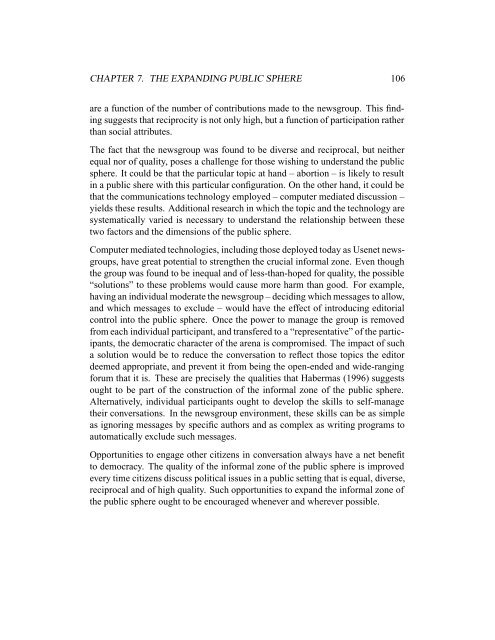Expanding the Public Sphere through Computer ... - ResearchGate
Expanding the Public Sphere through Computer ... - ResearchGate
Expanding the Public Sphere through Computer ... - ResearchGate
You also want an ePaper? Increase the reach of your titles
YUMPU automatically turns print PDFs into web optimized ePapers that Google loves.
CHAPTER 7. THE EXPANDING PUBLIC SPHERE 106<br />
are a function of <strong>the</strong> number of contributions made to <strong>the</strong> newsgroup. This finding<br />
suggests that reciprocity is not only high, but a function of participation ra<strong>the</strong>r<br />
than social attributes.<br />
The fact that <strong>the</strong> newsgroup was found to be diverse and reciprocal, but nei<strong>the</strong>r<br />
equal nor of quality, poses a challenge for those wishing to understand <strong>the</strong> public<br />
sphere. It could be that <strong>the</strong> particular topic at hand – abortion – is likely to result<br />
in a public shere with this particular configuration. On <strong>the</strong> o<strong>the</strong>r hand, it could be<br />
that <strong>the</strong> communications technology employed – computer mediated discussion –<br />
yields <strong>the</strong>se results. Additional research in which <strong>the</strong> topic and <strong>the</strong> technology are<br />
systematically varied is necessary to understand <strong>the</strong> relationship between <strong>the</strong>se<br />
two factors and <strong>the</strong> dimensions of <strong>the</strong> public sphere.<br />
<strong>Computer</strong> mediated technologies, including those deployed today as Usenet newsgroups,<br />
have great potential to streng<strong>the</strong>n <strong>the</strong> crucial informal zone. Even though<br />
<strong>the</strong> group was found to be inequal and of less-than-hoped for quality, <strong>the</strong> possible<br />
“solutions” to <strong>the</strong>se problems would cause more harm than good. For example,<br />
having an individual moderate <strong>the</strong> newsgroup – deciding which messages to allow,<br />
and which messages to exclude – would have <strong>the</strong> effect of introducing editorial<br />
control into <strong>the</strong> public sphere. Once <strong>the</strong> power to manage <strong>the</strong> group is removed<br />
from each individual participant, and transfered to a “representative” of <strong>the</strong> participants,<br />
<strong>the</strong> democratic character of <strong>the</strong> arena is compromised. The impact of such<br />
a solution would be to reduce <strong>the</strong> conversation to reflect those topics <strong>the</strong> editor<br />
deemed appropriate, and prevent it from being <strong>the</strong> open-ended and wide-ranging<br />
forum that it is. These are precisely <strong>the</strong> qualities that Habermas (1996) suggests<br />
ought to be part of <strong>the</strong> construction of <strong>the</strong> informal zone of <strong>the</strong> public sphere.<br />
Alternatively, individual participants ought to develop <strong>the</strong> skills to self-manage<br />
<strong>the</strong>ir conversations. In <strong>the</strong> newsgroup environment, <strong>the</strong>se skills can be as simple<br />
as ignoring messages by specific authors and as complex as writing programs to<br />
automatically exclude such messages.<br />
Opportunities to engage o<strong>the</strong>r citizens in conversation always have a net benefit<br />
to democracy. The quality of <strong>the</strong> informal zone of <strong>the</strong> public sphere is improved<br />
every time citizens discuss political issues in a public setting that is equal, diverse,<br />
reciprocal and of high quality. Such opportunities to expand <strong>the</strong> informal zone of<br />
<strong>the</strong> public sphere ought to be encouraged whenever and wherever possible.
















